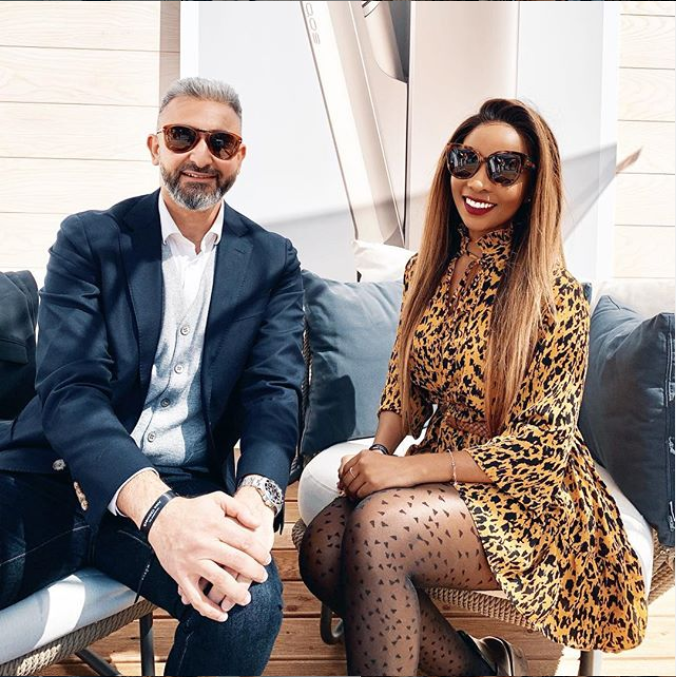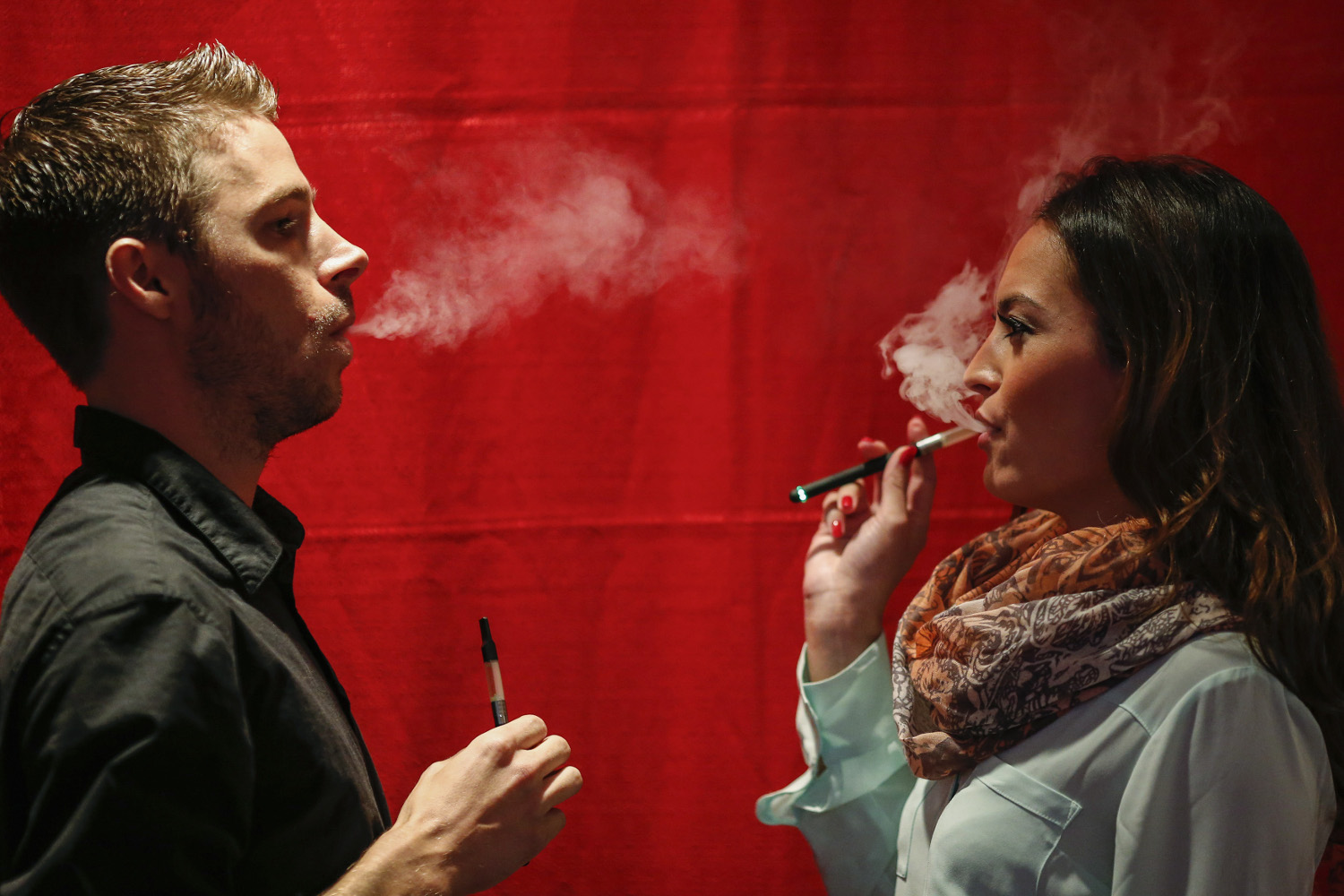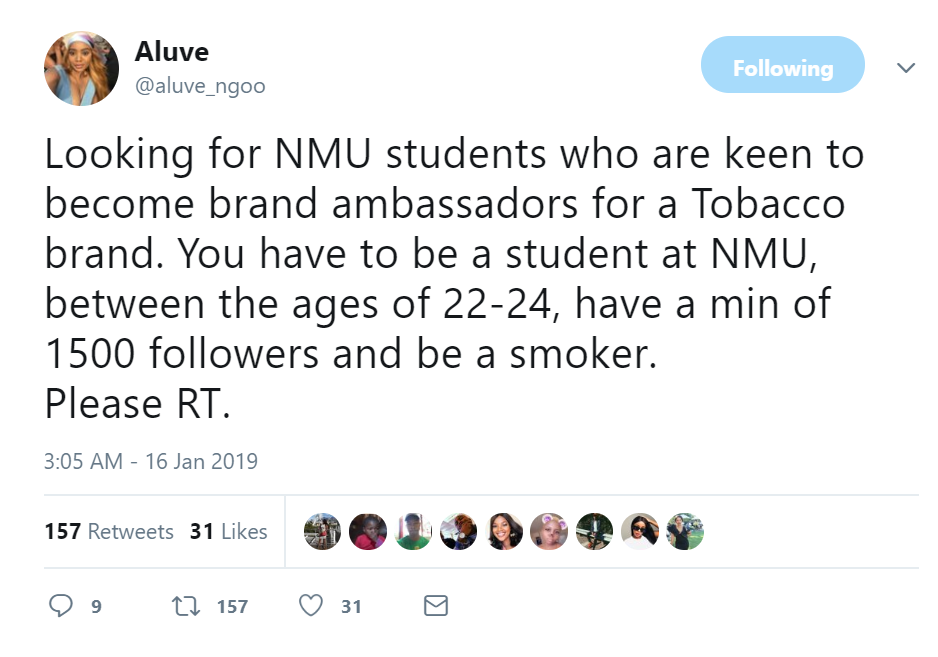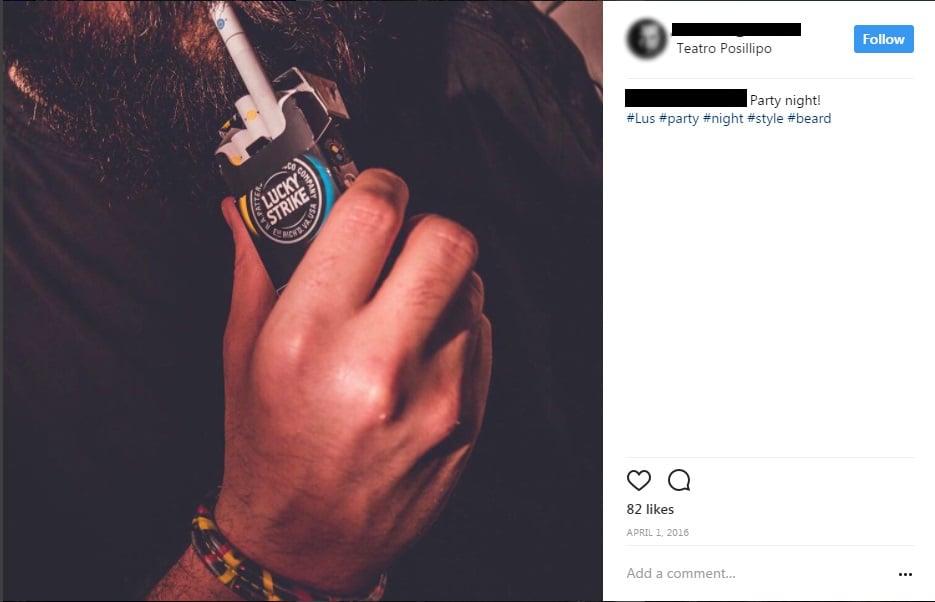Where there's smoke: An investigation by anti-tobacco nonprofit the Campaign for Tobacco-Free Kids found companies were paying young influencers to secretly advertise cigarettes on social media. (Instagram)
Tobacco companies are banned from advertising their products, but when they reach out to social media influencers they could blur the lines between what is legal and what’s not.
In April, Philip Morris South Africa sent MetroFm talk show host Pearl Modiadie to Italy for the opening of Milan Design Week – all expenses paid, according to Philip Morris’s marketing director Rishaad Hajee.
The annual exhibition draws hundreds of designers to the city to display their latest innovations in furniture, lighting, and installation art. Among the new designs featured at the fair this year was Philip Morris International’s heat-not-burn tobacco product, IQOS, short for “I Quit Ordinary Smoking”.
The company on its website describes IQOS as a smoke-free product that electronically heats tobacco just enough so that it will give off a “nicotine-containing vapour” instead of the pungent smoke emitted from traditional cigarettes.
During Modiadie’s stint in Milan, she published around 20 posts about the IQOS exhibition to her Instagram stories. The posts sent out to her more than 2-million followers included short videos of the IQOS exhibition and an interview with Hajee, in which he talks about IQOS as a better option for traditional smokers.
“[The] technology can still deliver the taste satisfaction of tobacco, but it reduces the levels of harmful components [found] in cigarettes,” he tells Modiadie.
The safety of IQOS is controversial. The United States regulator the Food and Drug Administration (FDA) approved the device for sale in America in April after it deemed the product less harmful than cigarettes.
But independent scientists scrutinised this claim, reviewing some of the data Phillip Morris presented to the FDA including one study that compared IQOS users to conventional smokers for three months. During this time, industry researchers monitored patients’ blood pressure, lung function and cholesterol, for instance, but not any cancer-related risks. IQOS users were not better off than the traditional smokers with regards to blood pressure, lung function and cholesterol at the end of the trial, the study published in the journal Tobacco Control found.
Hajee says this research is “misleading” because it ignores a decade’s worth of positive evidence conducted by various health agencies and regulators.
In South Africa, Modiadie is one of at least five prominent social media influencers who has been posting about IQOS this year.
South Africa’s 1993 Tobacco Products Control Act banned tobacco advertising. But a 1999 amendment to the Act went farther, prohibiting tobacco sponsorship, which prior to the days of social media would have looked like, for instance, sponsored sporting events or paying celebrities to wear branded clothes. Then, in 2009, legislation tightened again, stipulating that tobacco companies weren’t just banned from advertising directly but they were also prohibited from causing any other person from advertising or promoting their products.
In the age of the hashtag, legal experts warn South African social media influencers could now be falling foul of the law as new research shows that tobacco companies worldwide are increasingly taking to social media in a bid to woo younger customers.
‘But Hajee says Philip Morris South Africa doesn’t use social media to advertise or promote tobacco products in South Africa and that there is nothing untoward about Modiadie’s sponsored trip.
“Many companies and organisations around cover travel and accommodation costs for the media they invite to write about events”, he argues. “This was arranged for Pearl in her capacity as a Metro FM presenter.”
Modiadie did not respond to repeated requests for comment.
But tobacco-sponsored arrangements such as this could still be in violation of the Act, warns
Zamathiyane Mthiyane, a health and pharmaceutical specialist at the commercial law firm Werksmans Attorneys.
“[The Tobacco Products Control Act] states that no person may advertise or promote a tobacco product through any direct or indirect means including through sponsorship of any event”, she explains. “‘Advertisement’, in relation to tobacco products, is defined in the Tobacco Act as any commercial communication or action intended to promote the sale or use of any tobacco product to any member of the public.
“Thus, in light of the broad ambit of [the Act] … any promotion of tobacco products by an ‘influencer’ using a social media account may be prohibited”, Mthiyane says.
Violators may have to cough up as much as R1-million.
MetroFM didn’t respond to questions about its sponsorships policy.

Spotted: Metro FM presenter Pearl Modiadie sits down with Philip Morris South Africa’s Rishaad Hajee in Milan, Italy. The tobacco giant paid for Modiadie’s trip to the Milan Design Week, where it was exhibiting its new tobacco product, IQOS. (Instagram)
Tobacco legislation hasn’t kept up with the times, Gail Schimmel admits.
Schimmel is the head of the Advertising Regulatory Board, which replaced the previous industry regulator Advertising Standards Authority this year. The board enforces the country’s code of advertising practices and is trying to keep pace with the changing ways companies are using social media to get their messages out.
In May, the body publically updated the code on its website to include a section on social media that says celebrities must publicly disclose when they have been paid to promote a product, or sponsored to attend an event by using hashtags such as #ad or #sponsored. This includes instances in which influencers are given goods and services – such as plane tickets – in exchange for media coverage.
Schimmel calls the new social media guidelines a “first draft”, and says the body will continue to change and adapt these as industry changes.
It can take years to amend legislation. Schimmel says that voluntary industry regulators such as the Advertising Regulatory Board are better equipped than lawmakers to keep pace with fast-evolving advertising tactics.
“The thing about self-regulation is that it can be quick,” she says. “It can adapt to the situation and new media.
“So, with self-regulation, when you see a problem you address it — you consult with the stakeholders and you draft a solution.”
Only companies that have a contract with the ARB are bound by its rulings, although complaints against non-members are also investigated.
Metro FM host Modiadie did not disclaim that her trip had been sponsored by the tobacco giant.
But while the tobacco Act applies to individuals and companies, the Advertising Regulatory Board guidelines shift liability to brands.
“It’s the company’s responsibility to make sure influencers follow the rules.”
Earlier this year, Phillip Morris held launches in Johannesburg and Cape Town for its new IQOS product and invited local celebrities including DJ Fistaz Mixwell and Western Cape Good HopeFM radio host Tarryn Kay Trussel. Mixwell alone has more than 90 000 Instagram followers. Both denied being paid to attend.
“I review and collect gadgets as a hobby,” Mixwell explains.
Schimmel says that while Mixwell and Trussel may not have violated advertising codes of conduct in posting about the event, posting about tobacco events could still get social media celebs into trouble.
“Simply inviting an influencer to an event, with no payment for the promise of posts, does not count as advertising under our guidelines,” she says.
But, Schimmel cautions, it may still count as promotion under South Africa’s tobacco laws: “Influencers should get legal advice when they’re approached by tobacco companies.”
 It’s not just cigarettes. Tobacco companies are also punting their new products such as e-cigarettes and heat-not-burn products online. (Reuters)
It’s not just cigarettes. Tobacco companies are also punting their new products such as e-cigarettes and heat-not-burn products online. (Reuters)
Internationally, tobacco control legislation may no longer be able to afford to overlook the industry’s growing use of social media.
A March investigation by anti-tobacco nonprofit the Campaign for Tobacco-Free Kids found that tobacco giants in more than 30 countries — including Nigeria, Rwanda and Angola —were secretly paying young influencers to post about cigarettes.
The report’s authors allege it’s part of “a deceptive strategy to addict the next generation of smokers”.
South Africa was slated to be a part of the mammoth inquiry, says Tobacco-Free Kids country representative Zanele Mthembu, however Fees Must Fall protests for free higher education interrupted the research.
But Tobacco-Free Kids researchers may have been on the right track.
Eastern Cape lifestyle vlogger and Instagrammer Aluve Nguza in January tweeted about a tobacco job for influencers. She has more than 10 300 twitter followers.
“Looking for [Nelson Mandela University] students who are keen to become brand ambassadors for a tobacco brand”, she tweeted to her more than 10 300 followers. “You have to be a student at NMU, between the ages of 22-24, have a [minimum] of 1 500 followers and be a smoker.”
More than 150 young people replied, some posting pictures of themselves with cigarettes as examples.
Nguza didn’t respond to Bhekisa’s questions.

But in interviews with Tobacco-Free Kids researchers, influencers revealed how they go about secretly advertising cigarettes for brands including Philip Morris International British American Tobacco, and Japan Tobacco International.
Influencers told researchers they have to publish a certain number of photos a week with a product.
“The photos should be made in a subliminal way, as if — right now — I put the pack of cigarettes here on the table and I take a photo,” one influencer admitted, “because it’s obviously illegal”.
“The idea they want to give is that smoking is cool.”
Philip Morris denied using influencers to market cigarettes. Rather, social media is used to expand the company’s vision for a smoke-free future, which includes “coaching adult consumers to make the switch to smoke-free products,” says Corey Henry, a spokesperson for Philip Morris in the United States.
British American Tobacco South Africa’s Johnny Moloto says the company cannot comment on allegations against other branches.
Both Henry and Moloto say their companies only use social media in a way that complies with local local laws and tobacco regulations.
Japan Tobacco’s South African arm did not respond to requests for comment.
 Last strike: Tobacco companies paid influencers to post secret cigarette advertisements to their followers, an international investigation found. (Instagram)
Last strike: Tobacco companies paid influencers to post secret cigarette advertisements to their followers, an international investigation found. (Instagram)
In South Africa, tobacco companies are even roping in influencers to do their market research.
A leaked contract, which Bhekisisa has seen, reveals a Johannesburg-based company paid influencers to go to social events armed with boxes of British American Tobacco brands, including Peter Stuyvesant and Pall Mall.
Once at the event, the influencers were told to chat to other party-goers about the brand they were assigned and return with intel on trends, suggestions for new packaging, and any promotions run by other brands. This includes photos and videos of the people they spoke to.
Influencers could also swap one of their cigarettes with the partygoer as a tester – but only if they were asked, since free distribution of tobacco products is illegal.
The contract bans the influencers from posting anything about their work as ambassadors online.
British American Tobacco’s local arm (BATSA) head of external affairs Johnny Moloto declined to directly answer Bhekisisa’s questions about whether it was aware of this practice or if it condoned it. But he says the company is committed to following the law.
“At British American Tobacco we believe in upholding high standards of corporate behaviour. We agree that the tobacco industry should be regulated,” he says. “As is the case with many other fast-moving-consumer-good companies, we carry out market research from time to time. In all instances, such research is carried out in line with local law.” .
Moloto explains: “We expect anyone working on our behalf to adopt these principles and to apply them wherever they are working for us. All British American Tobacco contracts with suppliers stipulate that the service provider must give effect to British American Tobacco’s policies and adhere to all laws of South Africa. Our contract with the service provider in this instance was no exception.”
Moloto says his company “does not use social media to promote our cigarette brands”. “However, we are unable to prevent private users of social media from showing these brands in their private posts.”
The kind of market research described in the contract seen by Bhekisisa could be seen as promotion under the tobacco laws, says director at commercial law firm Phukubje Pierce Masithela Attorneys Lucien Pierce.
He says it’s the use of influencers instead of anonymous field researchers that is suspicious.
“The influencer, who is asking the questions, is being associated with the brand and making it look cool, even though they’re only asking questions.”
Pierce concludes: “Tobacco companies are sailing far too close to the wind.”